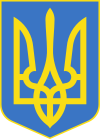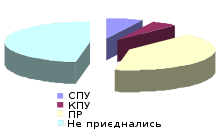- Alliance of National Unity
-
Ukraine 
This article is part of the series:
Politics and government of
UkraineConstitutionExecutive- President
- Viktor Yanukovych
- Administration
- National Security and
Defence Council - Presidential representatives
- Presidential symbols
- Prime Minister
- Cabinet
Legislature- Parliament
- Chairman
- People's Deputy of Ukraine
- Imperative mandate
Judiciary- Judicial system
- Constitutional Court
- Supreme Court
- Prosecutor General
DivisionsElectionForeign relationsSee also- Ukrainian nationalism
- Declaration of Independence
- Proclamation of Independence
- Cassette Scandal
- Ukraine without Kuchma
- Orange Revolution
- Russia-Ukraine gas disputes
- 2006 political crisis
- Universal of National Unity
- 2007 political crisis
- 2008 political crisis
- Kharkiv treaty
Other countries · Atlas
Politics portal
Contents
Overview
Before the crisis which sparked the 2007 parliamentary election, the coalition consisted of the following 249 members of parliamentary parties:
- Party of Regions (186)
- Socialist Party of Ukraine (31)
- Communist Party of Ukraine (21)
- Yulia Tymoshenko Electoral Bloc (6)
- Our Ukraine (5)
At its highest point the Alliance consisted of 260 members, and the trend was that opposition members were willing to join the Alliance, and thereby undermine the authority of the President and move towards the 300 constitutional majority.
On April 6, 2007 the coalition's members count was reduced to 238 members:[3][4]
- Party of Regions (186)
- Socialist Party of Ukraine (31)
- Communist Party of Ukraine (21)
Fall of cabinet
President of Ukraine Yushchenko dissolved parliament on 2 April 2007 because he believed the government was acting illegally during the 2007 Ukrainian political crisis. Yushchenko argued that the constitution only allows whole parliamentary blocs to change sides, not individuals deputies. Yushchenko, Yanukovych and parliamentary speaker Oleksandr Moroz agreed in late May 2007 that the election would be held on 30 September, provided that at least 150 opposition and pro-president MPs formally gave up their seats, thereby creating the legal grounds for dissolving parliament. This happened.[5]
Composition
The Cabinet of Ministers of Ukraine of the Alliance of National Unity had been appointed on August 4, 2006,[6] it served until the twelfth Cabinet and Second Tymoshenko Government was chosen on December 18, 2007.[7] It's composition was:
- Prime Minister - Viktor Yanukovych (Party of Regions)
- First Vice Prime Minister, Finance Minister - Mykola Azarov (Party of Regions)
- Vice Prime Minister in affairs of Building, Architecture and Housing and Communal Services - Volodymyr Rybak
- Vice Prime Minister - Andriy Klyuev (Party of Regions)
- Vice Prime Minister - Dmytro Tabachnyk (Party of Regions)
- Vice Prime Minister - Viktor Slauta
- Vice Prime Minister - Volodymyr Radchenko (January 12 - May 25, 2007) replaced with Oleksandr Kuzmuk
- Minister of Internal Affairs - Vasyl Tsushko (Socialist Party of Ukraine)
- Minister for Foreign Affairs - Borys Tarasyuk (dismissed on December 1, 2006)[8] replaced with Arseniy Yatsenyuk
- Minister of Coal Mining Industry - Serhiy Tulub (Party of Regions)
- Minister of Culture - Yuriy Bohutsky
- Minister of Defense - Anatoliy Hrytsenko
- Minister of Economy - Volodymyr Makukha replaced with Anatoliy Kinakh (Industrials and Entrepreneurs)
- Minister of Education and Science - Stanislav Nikolaenko
- Fuel and Energy Minister - Yuriy Boyko
- Minister of Labor and Social Policy - Mykhailo Papiev
- Health Minister - Yuriy Polyachenko
- Minister of Agro-Industrial Complex - Yuriy Melnyk (Ukrainian People's Party)
- Minister of Industrial Policy - Anatoliy Holovko
- Minister of Environmental Protection - Vasyl Dzharty
- Minister of Transport and Communications - Mykola Rudkovsky
- Minister of Emergencies - Nestor Shufrych
- Minister for Family, Youth and Sport - Viktor Korzh
- Minister of Justice - Oleksandr Lavrynovych
- Minister in connections with Verkhovna Rada and other state authorities - Ivan Tkalenko
- Minister of the Cabinet of Ministers - Anatoliy Tolstoukhov
References
- ^ "Agreement on creation of Anti-Crisis Coalition beetwean parties" (in Ukrainian). 2006-07-07. http://zakon1.rada.gov.ua/cgi-bin/laws/main.cgi?nreg=n0005001-06.
- ^ "Ukrainian ruling parliamentary coalition renamed as Alliance of National Unity". People's Daily Online. 2007-04-27. http://english.people.com.cn/200703/24/eng20070324_360674.html.
- ^ "Transcript of Verkhovna Rada meeting" (in Ukrainian). Official parliament website. 2007-04-06. pp. at about 13:27:02. http://www.rada.gov.ua/zakon/skl5/3session/STENOGR/06040703_28.htm.
- ^ "Coalition officially reduced to 238 deputies" (in Ukrainian). UNIAN. 2007-04-06. http://www.unian.net/ukr/news/news-191021.html.
- ^ Q&A: Ukrainian parliamentary poll , BBC News (1 October 2007)
- ^ announcement on the Ukrainian parliamentary official website
- ^ Laws of Ukraine. Order of the Verkhovna Rada No. 10-VI: On the formation of the composition of the Cabinet of Ministers of Ukraine. Passed on 2007-12-18. (Ukrainian)
- ^ (Yushchenko issued a decree that Tarasyuk must keep his job. Despite a court order and a presidential decree, he was not allowed to enter cabinet meetings. Tarasyuk resigned at the end of January 2007)
External links
- Governmental Portal of Ukraine - official site of the Cabinet of Ministers
All Cabinets of Ukraine* Ukrainian People's Republic
(1917–1920)General Secretariat (1917) • Holubovych Government (1918) • Vasylenko Government (1918) • Lyzohub Government (1918) • Gerbel Government (1918) • Chekhivsky Government (1919) • Ostapenko Government (1919) • Martos Government (1919) • Mazepa Government (1920) • Prokopovych Government (1920) • Livytskyi Government (1920)Ukrainian SSR
(1917–1991)Artem Government (1917-1918) • Council of People's Secretaries (1917-1918) • Provisional Workers-Peasants Government of Ukraine (1918-1919) • All-Ukrainian Revolutionary Committee (1919-1920) • Council of People's Commissars (1919-1946) • Khrushchev Government (1944-1947) • Second Korotchenko Government (1948-1954) • First Kalchenko Government (1954-1957) • Second Kalchenko Government (1957-1961) • First Shcherbytsky Government (1961-1963) • Kazanets Government (1963-1965) • Second Shcherbytsky Government (1965-1968) • Third Shcherbytsky Government (1968-1972) • First Lyashko Government (1972-1976) • Second Lyashko Government (1976-1981) • Third Lyashko Government (1981-1986) • First Masol Government (1987-1990)Ukraine
(1991-Present)Fokin Government (1990-1992) • Kuchma Government (1992-1993) • Second Masol Government (1994-1995) • Marchuk Government (1995-1996) • Lazarenko Government (1996-1997) • Pustovoitenko Government (1997-1999) • Yushchenko Government (1999-2001) • Kinakh Government (2001-2002) • First Yanukovych Government (2002-2004) • First Tymoshenko Government (2005) • Yekhanurov Government (2005-2006) • Alliance of National Unity (2006-2007) • Second Tymoshenko Government (2007-2010) • Azarov Government (2010-present)- Acting cabinets not included
Categories:- Political parties in Ukraine
- Cabinets of Ukraine
Wikimedia Foundation. 2010.
Look at other dictionaries:
National Unity (Peru) — Unidad Nacional Leader Lourdes Flores Nano Founded 2000 … Wikipedia
National Unity (Ireland) — National Unity was an Irish nationalist political study group in Northern Ireland. Nationalism in Northern Ireland in the late 1950s was dominated by the Nationalist Party. This effectively operated as a network of elected politicians. Its… … Wikipedia
National Unity of Hope — Unidad Nacional de la Esperanza Leader Álvaro Colom Founded 2002 (2002) Ideology Social d … Wikipedia
National Unity Party (Philippines) — National Unity Party Leader Pablo P. Garcia Chairman Pablo P. Garcia President Rodolfo Antonino Secretary General Roger Mercado … Wikipedia
National Unity Movement (Nicaragua) — Nicaragua This article is part of the series: Politics and government of Nicaragua Constitution President … Wikipedia
National Unity Party (Dominican Republic) — The National Unity Party (Spanish: Partido de Unidad Nacional) is a minor political party in the Dominican Republic. It first contested national elections in 2002,[1] when it received less than 1% of the vote and failed to win a seat. For the… … Wikipedia
National Unity Party (Canada) — Parti National Social Chrétien Canadian National Socialist Unity Party National Unity Party Founded 193 … Wikipedia
National Unity Party (Mozambique) — The National Unity Party (Portuguese: Partido de Unidade Nacional) is a political party in Mozambique. At the last legislative elections, 1 and 2 December 2004 , the party was the main part of the Renamo UE electoral alliance, that won… … Wikipedia
National Unity Party (Malawi) — The National Unity Party is a political party in Malawi. In the last general elections, (20 May 2004), the party was part of the Mgwirizano Coalition, that won 27 out of 194 seats. v … Wikipedia
National Unity Democratic Organisation — The National Unity Democratic Organisation is a political party in Namibia that is based among the Herero. NUDO was part of the Democratic Turnhalle Alliance (DTA) from the Turnhalle Constitutional Conference of the 1970s until it withdrew in… … Wikipedia



